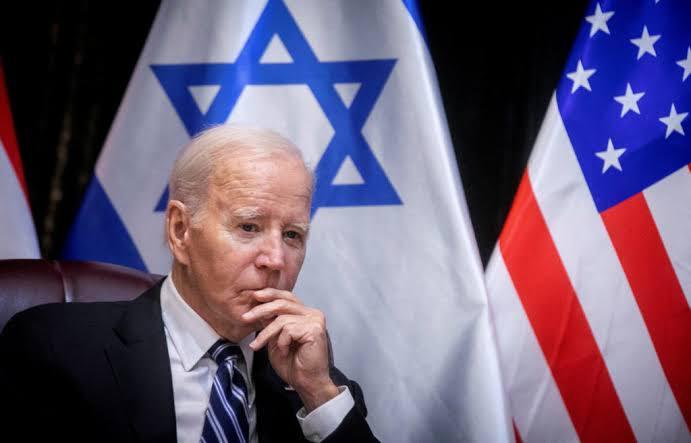
Opinion| Has Washington Retreated From Its Previous Strategy?
The war in Ukraine was seen by political analysts as a potential catalyst for Washington to reconsider its strategy. However, despite the war's challenges and its adverse impact on global economies, it did not prompt Washington to abandon its reduction strategy. The situation remained unchanged until the events in Gaza on 7 October. These events shifted perspectives within the White House, the Pentagon, and Congress. Within hours, orders were issued for a military deployment to the Israeli and Palestinian coasts. Shortly thereafter, the three largest military carriers arrived in the Mediterranean Sea, signaling a possible reversal of Washington's reduction strategy. Ultimately, Washington recognized that those who wield power can shape history to their liking, at least temporarily.
In reality, the American administration viewed the Ukraine crisis as insufficient grounds to deviate from its established stance. Instead, the conflict in Ukraine could serve as a means for Washington to weaken Russia, similar to the situation in Afghanistan. Conversely, the American perspective on the events in Gaza is markedly different. These events could serve as a primary justification for reversing the reduction strategy, should the desire arise. This is attributed to several key factors:
Firstly, a defeat to Israel does not only harm Tel Aviv, but also affects American prestige, and this reflects negatively on its interests in all parts of the world. Secondly, Israel was promised to be the policeman of the oil region in the future, and this attack greatly weakened its credibility in Washington. Third, Hamas' success in embarrassing Israel automatically benefits not only Iran as the movement's main supporter, but also all movements and organizations opposed to Israel and America in the Middle East, whether in Syria, Iraq, or Lebanon. This may also encourage other parties to engage in the same experience against American and Israeli interests around the world. Fourth, European countries suffered from a bitter winter experience as a result of the sharp decline in oil and gas supplies to Europe due to the Ukraine war. They were only saved by gas and oil agreements they signed with Arab countries to replace Russian gas. Therefore, the outbreak of an Arab-Israeli conflict will effectively mean the death of Europe, because there will be an oil and gas embargo on European countries if the circle of conflict expands, and the experience of the 1973 war is still fresh in our minds when the Arabs prevented the pumping of oil to Europe. Therefore, it was not strange to find French and British war fleets participating in the American fleet.
It is currently unclear whether the United States has altered its stance on the Gaza crisis or remains committed to its reduction strategy. Meanwhile, China and Russia hold differing views and are adopting a wait-and-see approach. During Chinese President Xi Jinping's recent visit to Moscow, Russian President Vladimir Putin greeted him at the Kremlin's entrance to bid farewell. Xi remarked to Putin,“We are witnessing changes unprecedented in a century, and it is we who are spearheading these changes together.” Putin concurred, saying,“I agree with you.”
The conversation's casual tone belied its significance, and the phrase“changes the likes of which we have not seen in a century” later became pivotal to the Chinese-Russian initiative.
While the statement may appear broad, it encapsulates the contemporary Chinese perspective on the evolving global landscape, or rather, the emerging“disorder.” As China's influence grows, Western policymakers and analysts have sought to discern China's vision for the world and the global order Beijing intends to establish. It has become evident that Chinese strategists prefer to leverage the existing world order-or its imminent iteration-rather than overhaul or replace it entirely.
Most Western leaders and policymakers strive to uphold the rules-based international order, but Chinese strategists are increasingly transparent about their objective: to navigate a world devoid of order. The Chinese leadership, from Xi down to lower-level officials, believes that the global order established post-World War II is now obsolete and that efforts to maintain it are in vain. Rather than attempting to salvage the system, Beijing is bracing for its collapse.
Although both China and the United States acknowledge the end of the post-Cold War order, neither is wagering on the nature of the forthcoming order. In Washington, some contend that the resurgence of great power rivalry necessitates revitalizing the alliances and institutions central to the post-World War II order, which facilitated the United States' Cold War victory over the Soviet Union. The envisioned updated global system seeks to incorporate most nations, potentially isolating China and key allies such as Iran, North Korea, and Russia.
If successive American administrations have struggled with their foreign policy objectives over the past two decades, particularly in combating terrorism, their credibility is now in question, compounded by persistent ambiguity. At this juncture, China and Russia remain resolute, poised to capitalize on any forthcoming errors.
Dr. Hatem Sadek – Professor at Helwan University

Legal Disclaimer:
MENAFN provides the
information “as is” without warranty of any kind. We do not accept
any responsibility or liability for the accuracy, content, images,
videos, licenses, completeness, legality, or reliability of the information
contained in this article. If you have any complaints or copyright
issues related to this article, kindly contact the provider above.























Comments
No comment